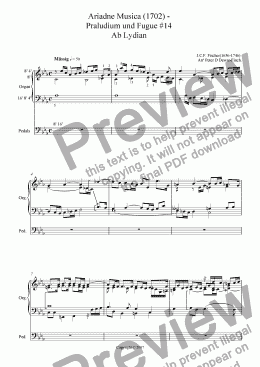Ready to print
You have already purchased this music, but not yet printed it.
This page is just a preview and does not allow printing. To print your purchase, go to the My purchases page in your account and click the relevant print icon.
Ariadne Musica (1702) - Praludium und Fugue #14, Ab lydian

Already purchased!
You have already purchased this score. To download and print the PDF file of this score, click the 'Print' button above the score. The purchases page in your account also shows your items available to print.
This score is free!
Buy this score now
Ariadne Musica (1702) - Praludium und Fugue #14, Ab lydian
$1.50
Instant download
You are purchasing high quality sheet music PDF files suitable for printing or viewing on digital devices.Ariadne Musica by Johann Caspar Ferdinand Fischer is perhaps the most seminal work in the development of classical music. And as all Western music systems are descended from it almost everything from Classical music to Rock, - Jazz to Pop and their �offspring� owe Fischer a debt of recognition, if not gratitude.
In my reinterpretation of the pieces I have endeavoured to keep the form as close to the originals as the digital medium will allow. For anyone wishing to play this series, these interpretations are fairly close to the originals, so any organist could do worse than to follow my tacit suggestions. It takes time to find each separate prelude and each separate fugue and to work out what sound was intended. My Hammond organ is less than ideal for the purpose, but as I don�t have a church pipe organ it will have to do. As I complete each reinterpretation for midi I will add them to this folder until I have amassed the whole set.
In his expert appraisal of J.C.F. Fischer, the eminent conductor Karl Ludwig Nicol wrote: �Johann Casper Ferdinand Fischer was not only very popular, but had great influence on the development of the musical life at the beginning of the 18th century. Bach's biographer Johann Nikolaus Forkel stated in 1802: "The most famous composers for piano of that time were Froberger, Fischer, Joh. Casp. Kerll, Pachelbel, Buxtehude, Bruhns, Bohm etc." And Max Seiffert concluded: "In his time, he was outstanding as one of the most distinguished and capable artists, and one cannot exclude him any longer from the place of honour as a forerunner of the great St.Thomas cantor (Sebastian Bach) beside Pachelbel and Buxtehude".
From Wikipedia, the free encyclopaedia: �The title refers to the Greek myth in which Theseus is able to find his way out of the Minotaur's labyrinth by using a ball of thread which Ariadne, the daughter of King Minos of Crete, gave him. Similarly, the music in the collection can be said to guide the listener through a labyrinth of keys. Fischer also used Greek mythology to name the pieces in another large scale music collection of his, Musikalischer Parnassus.
�The first edition of Ariadne musica was made in 1702 in Schlackenwerth. The work was reprinted several times during Fischer's life. The original print mentioned by Johann Gottfried Walther in Musicalisches Lexicon is now lost, but a manuscript copy survives.�
�From 1706 onwards Fischer worked at the court of the Margrave of Baden altogether for more than fourty years. Johann Caspar Ferdinand Fischer became a part of musical history as one of the most important German composers of piano suites between Froberger on the one hand, and Johann Sebastian Bach and Handel, on the other hand. Both grand masters of the late baroque estimated Fischer�s works very much and adopted, according to the habits of the time, thematic and compositional-technical impulses from them. (K.L.N.)
The musicalhistorical importance of the Ariadne Musica cycle is based on a composition demonstrating as it were, the equal ("well-tempered") temperament of Andreas Werckmeister that was quite contested till the end of the 18th century: the great number of twenty keys (up to five accidentals!) was extraordinary in that time; it was presented in a sequence of small pairs of preludes and fugues. (Of the 24 keys only D flat major, E flat minor, F sharp major, G sharp major and B flat minor are not presented.) (K.L.N.)
Ariadne musica was written in a time when a new and richer system of temperaments in musical practice was developed. Whereas the former mean-tone temperament with its eight pure major thirds allowed only special keys as "pure" ones, many theorists and practical men around 1700 (like Werckmeister 1691) tried to make a greater number of keys possible through new systems of temperaments. This was made by distributing the pure and unequal ("well-tempered") fifths among the complete volume of tones. So for Fischer's Ariadne musica at least twenty keys can be used; however, not all of them are equally "pure"-tuned, for, with a growing number of accidentals in an unequal temperament, the keys seem to be considerably sharpened. (K.L.N.)
Anyway, it is still not the question in that time of the nowadays usual equal temperament where the octave is divided into always equal half-tone steps and thereby makes it possible to use all keys in the same way. In this context the characteristic features of the keys as they were described by baroque teachers like Mattheson always refer to an unequal temperament as it was still used around 1750. As Gotthold Frotscher proved, there are "manyfold inner relations" between Fischer's Ariadne and Bach's Wohltemperiertes Kla-vier. (K.L.N.)
After all these detailed statements it seems that Bach's biographer Forkel had hardly exaggerated by saying that Fischer's Ariadne musica had inspired Bach to write the Wohltemperierte Klavier. In regard to their extent the fugues often correspond exactly to the preludes and take their motivic material from them.�
(Karl Ludwig Nicol)
http://en.wikipedia.org/wiki/Ariadne_musica http://en.wikipedia.org/wiki/Johann_Caspar_Ferdinand_Fischer



